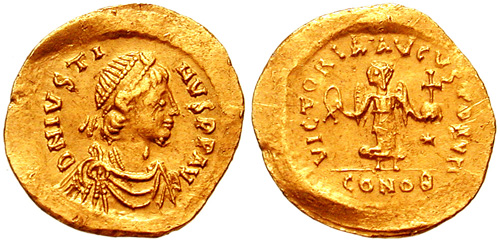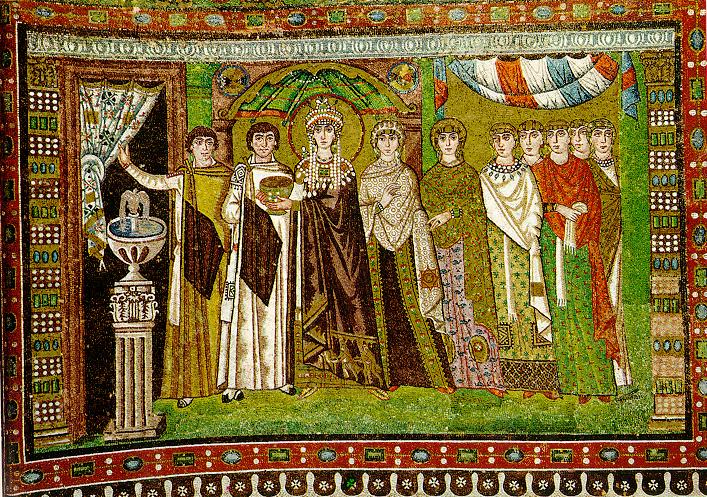
Theodora, future empress of the Byzantine Empire, was born
in 500 AD, the daughter of a bear-keeper. Her father, Acacius, was employed by
the Green faction at Constantinople’s Hippodrome[i]. Her mother was a circus
performer, possibly an acrobat. This alone would have been enough to bar
Theodora from the upper echelons of society. But as a child Theodora joined her
sister on the stage playing low burlesque.
Theodora’s father died when she was six and her mother
remarried hoping that the role of Green’s bear-keeper would be given to her new
husband. The job had already been awarded to another applicant. Theodora’s
mother took her three daughters to the Circus and appealed to the audience. The
Greens ignored the appeal, but the Blue faction supported the indigent widow;
possibly to highlight the uncharitable actions of the Greens. The Blues found
Theodora’s stepfather a job and from then on all her loyalties were for the
Blue faction and she became an inveterate hater of the Greens.A talented mimic, Theodora soon attracted followers and graduated to the role of courtesan. Procopius claimed that, while still too young for heterosexual sex, Theodora acted as a catamite substitute for slaves, who were too poor to afford the real thing. Procopius was antagonistic towards Theodora and her husband and probably used back streets titillating gossip for use in his polemical Secret History.
At sixteen Theodora became the mistress of a civil servant,
named Hecebolus, and accompanied him to Pentapolis in North Africa, where he
was in charge of the regional government. It is uncertain how long she stayed
in Africa with Hecebolus, but she did not re-appear in Constantinople until about
ten years later. While there the couple had a violent quarrel and she was
dismissed. Procopius claims that she paid for her journey home with sexual
favours, which may well be true for a young woman stranded in a foreign country
and no resources to call upon.
‘From
then on she provided in her customary fashion by making her body the tool of
her lawless trade.’[ii]Theodora stayed for a time in Alexandria. It has been suggested that she was struck by a religious experience while in the city, possibly coming into contact with the leading churchmen. Alexandria was a centre for Miaphytisism[iii] and it may have been at this time that Theodora picked up her strongly held beliefs in this sect. Her life style altered dramatically upon her return to Constantinople, her experiences abroad having matured her.
Sometime in or around 520 AD, after her return from
Pentapolis, Theodora met the emperor Justinian. Justinian was co-emperor with
his uncle Justin, who adopted the young Petrus Sabbatus, probably while he was
an officer in one of the imperial palace regiments. At the same time Justinian
assumed the name, by which he would become known to history.
Coins showing the head of the Emperor Justin
The emperor Justin was the successor of the emperor
Anastasius. Justin was of peasant origin and prior to his accession had been
the Commander of the Excubitors[iv]. Justin became emperor in July 518. It is
possible that Justinian engineered his uncle’s accession to the imperial
purple.
‘Justin
on the strength of this command succeeded to the throne, though he was by now a
doddery old man, totally illiterate – in popular parlance, he didn’t know his
ABC – an unheard of thing in a Roman.’[v]
Almost immediately after his accession Justin made Justinian
a Patrician and Count of the Domestics, a powerful position which gave him
access to the centre of power. From now on Justin relied heavily on his nephew,
willing to be guided by him in all things. Both Justin and Justinian were
supporters of the Blues faction.
Justinian celebrated his consulship in 521 AD with an
amazingly extravagant games at the Hippodrome. The equivalent of 3,700 lbs of
gold was spent on the decorations alone. In Anastasius’ reign fiscal rectitude
had been the order of the day and Justinian wanted to show his uncle’s new
subjects that a glorious new era was dawning.‘He had no sooner seized upon his uncle’s authority than he began to squander public money in the most reckless manner and with the greatest satisfaction.’[vi]
Justinian brokered the repair of the breach with Rome,
resulting from the ex-communication of the Patriarch Acacius in 484 AD. In
March 519 AD a papal embassy arrived in Constantinople and two days later
Patriarch John declared the churches indivisible.
The Empress Theodora and attendants from a mural in Ravenna
Justinian was captivated by Theodora and made her his
mistress; fathering a child on her[vii]. Justinian wanted to
marry Theodora but there were two impediments. There was a law forbidding those
of high rank to marry actresses. The second impediment was Justinian’s wife, a
peasant girl named Lupicina, who took the name Euphemia on her husband’s
accession to the throne. Euphemia, surrounded by high ranking women, felt able
to look down on Theodora’s lowly beginnings.
Justinian was freed
by Euphemia’s death in 524 AD and within weeks Justin had approved a law
allowing retired actresses, who had been given high dignities, to marry anyone
they chose. This law may have scandalised the upper reaches of society. It
certainly scandalised Procopius
‘He
forced the emperor to abrogate the laws by establishing a new one. From that
moment on he lived with Theodora as his legal spouse thereby enabling everyone
else to get engaged to a courtesan.’[viii]
Theodora married Justinian later in the year and on 4th
April 527 the couple were crowned co-emperor and empress. Four months later
Justin died. Theodora was now co-ruler of the Byzantine Empire, able to make
decisions in her own right.
Bibliography
Byzantium – The Early Centuries – John Julius Norwich, Folio
Society 2003
The Secret History – Procopius – Folio Society 1990
En.wikipedia.org [i] There were four factions, named after colours, at the Hippodrome; all rivalling for supremacy, but by this period only the Blues and Greens had any real influence.
[ii]
Secret History - Procopius
[iv]
One of the crack imperial palace regiments
[v]
Secret History – Procopius
[vi]
Secret History - Procopius
[vii]
The child died in infancy
[viii]
Secret History - Procopius


I know very little about Theodora and Justinian except from the 'John the Eunuch' [Mayer and Reed]mystery stories so this is fascinating background that will enable me to enjoy them still further. Thank you!
ReplyDelete